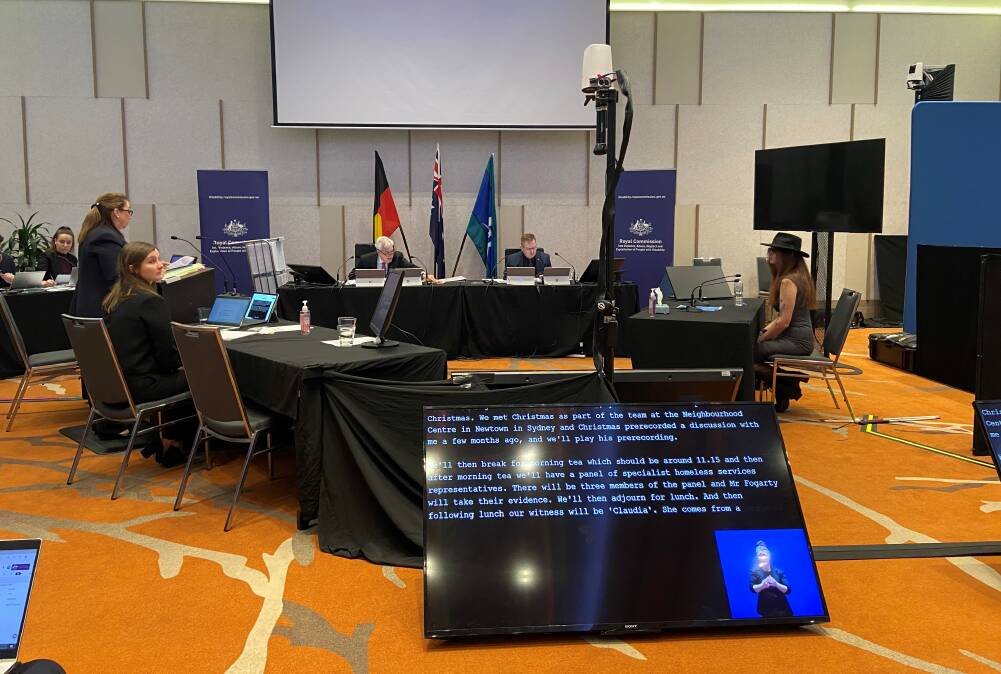
A legally blind Newcastle parent has described feeling like they were "treated like a criminal" by the public housing system in a stressful journey to secure a home.
Nik Moorhouse, who goes by they/them pronouns, shared their housing battle with the Royal Commission into Violence, Abuse, Neglect and Exploitation of People with Disability on Tuesday, detailing fears of becoming stuck in a "poverty trap" through welfare and social housing and how the system could be improved.
Ms Moorhouse, 45, was served an eviction notice on a private rental earlier this year and has struggled to find a home suited to their needs and those of their two teen daughters who live with autism.
Ms Moorhouse has visual snow syndrome - a neurological disorder that impacts vision clarity, spatial awareness and depth perception. They can no longer drive and need lights dimmed due to photosensitivity.
The family lived in a private rental from 2016, but Ms Moorhouse said they repeatedly raised issues including mould, rust, leaking and having to stand on a board to use the shower. After being informed in January they had to vacate for repairs to be undertaken, Ms Moorhouse was told they could later return, but the rent would rise.
"It's now on the market at 590," Ms Moorhouse said. "I was struggling to pay 420."
They said staying in Newcastle was preferred to be close to their daughter's father who shares custody, as well as support such as Vision Australia.
Ms Moorhouse providing evidence during the five-day hearing in Parramatta. Picture supplied by the Disability Royal Commission

Ms Moorhouse's eldest daughter elected to move out earlier than she wanted to help make the search easier.
But navigating the crowded rental market proved a challenge, with Ms Moorhouse unable to decipher rental listings on a screen nor identify if properties met their needs. Crisis accommodation was also considered, but it wasn't ideal for a disabled parent and child.
"It was extremely stressful... not knowing what's going to happen or where you're going to end up causes a lot of anxiety and obviously... anxiety exacerbates my condition," Ms Moorhouse said.
"For my younger daughter... she struggled with the house being boxed up and she struggled with not knowing what was going to happen. She was having several meltdowns a day."
Ms Moorhouse applied for public housing before moving into the private rental in 2016. A house became available in October last year, but Ms Moorhouse believed it was unsafe as well as too far from schools and public transport.
"This was a very, very small house," Ms Moorhouse said. "It had a very small narrow corridor running down the middle of it, but the bathroom itself was very, very small and - from what I can remember - the shower didn't have a cubicle. It had a very weird sort of shower tray that was pretty much the same colour as the tiles. I really couldn't see it."
But Ms Moorhouse said the Department of Housing advised this would be considered a rejection of a "reasonable offer" unless an occupational therapist agreed it was unsuitable. But Ms Moorhouse was stuck on a waiting list to see an OT.
With the understanding the department would only make two "reasonable offers", Ms Moorhouse described being in "a desperate place".
The department offered a second home this year, which was more suitable. Ms Moorhouse accepted it.
"This one was close to my daughter's school," Ms Moorhouse said. "It's very close to bus stops. It's very close to grocery stores. The property itself already had things like hand rails."
While happy to have a home, Ms Moorhouse said her experience as a private renter compared to a public tenant was starkly different.
"I guess there's a loss of agency or authority over my own disability in that I need an OT... someone who isn't inside my body, who doesn't know what I'm dealing with on a daily basis, to explain to them what my needs are," Ms Moorhouse said.
"When I have been into the Department of Housing, you're sort of treated a little bit like you're a criminal, like you have done something wrong and that perhaps you don't deserve to be treated with respect. I think there is a poverty trap around being on Centrelink and particularly being in a house provided by the Department of Housing, and a concern for me is that I won't be able to get myself out of it."
Ms Moorhouse said things could be improved through better linkage between Housing and the NDIS and the department working with the client rather than relying on therapist reports.
WHAT DO YOU THINK? We've made it a whole lot easier for you to have your say. Our new comment platform requires only one log-in to access articles and to join the discussion on the Newcastle Herald website. Find out how to register so you can enjoy civil, friendly and engaging discussions. Sign up for a subscription here.







